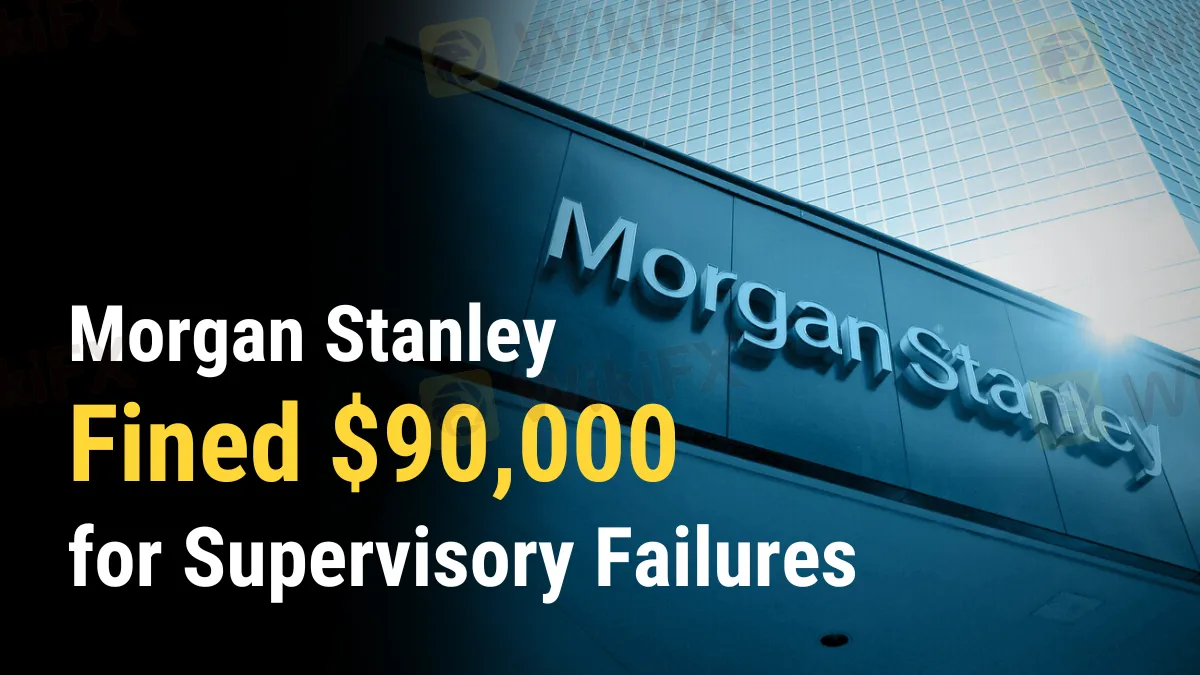简体中文
繁體中文
English
Pусский
日本語
ภาษาไทย
Tiếng Việt
Bahasa Indonesia
Español
हिन्दी
Filippiiniläinen
Français
Deutsch
Português
Türkçe
한국어
العربية
Morgan Stanley Fined $90,000 for Supervisory Failures
Abstract:Morgan Stanley was fined $90,000 for failing to supervise employee trading activities on NEX SEF, underscoring the importance of robust oversight in financial markets.

On April 17, 2024, the NEX SEF punished Morgan Stanley for its inability to effectively oversee a worker's trading actions on the platform from January to May 2021. The results showed that to move positions across his controlled Morgan Stanley accounts, the trader made self-matched transactions on the NEX SEF. The non-deliverable forward instruments traded in these deals were the Indian Rupee, Indonesian Rupiah, Korean Won, Malaysian Ringgit, and Taiwan Dollar.
Although Morgan Stanley received a warning from the NEX SEF on the dubious activity, its control and monitoring procedures proved to be inadequate in detecting and halting the ongoing self-matching transactions. The Panel concluded that the participant's failure to monitor the behavior of their employees and agents on the platform infringed under NEX SEF (legacy) Rule 407(h).
Morgan Stanley did not acknowledge or refute the factual findings or rule breaches in response to the disciplinary action. Nevertheless, they agreed to a settlement that included a monetary penalty of $90,000. This penalty serves as a poignant reminder of the paramount need for robust supervision and compliance protocols inside financial institutions.

The instance highlights how difficult it is for regulatory agencies to maintain market integrity and stop wrongdoing, especially when it comes to computerized trading. The intricate dynamics of financial markets require constant attention to detail from companies to prevent security lapses and preserve investor trust.
Other market players should take note of this disciplinary action against Morgan Stanley, which emphasizes the serious consequences of inadequate supervision. To identify and stop fraudulent activity and ultimately protect the integrity and stability of the financial markets, it highlights the vital role that efficient monitoring and surveillance systems play.
Investment in strong compliance infrastructure and training programs must be given top priority by financial institutions as regulatory scrutiny increases and technology continues to change trading practices. Mitigating operational risks and guaranteeing regulatory compliance need proactive steps to improve oversight and monitoring capabilities.
Finally, the financial sector should take note of Morgan Stanley's disciplinary action as a reminder of the need for strict oversight and compliance with legal requirements. Through the process of assiduously analyzing these occurrences, market players will be able to preserve the integrity of the world's financial markets and promote a transparent and accountable culture.

Disclaimer:
The views in this article only represent the author's personal views, and do not constitute investment advice on this platform. This platform does not guarantee the accuracy, completeness and timeliness of the information in the article, and will not be liable for any loss caused by the use of or reliance on the information in the article.
Read more

Hong Kong Exchange Pioneers Asia's First EU-Compliant Crypto Index
HKEX to launch Asia's first EU-compliant crypto index series, enhancing Hong Kong's position in digital finance with secure, regulated Bitcoin and Ether benchmarks.

HKEX to Open Riyadh Office in 2025, Strengthening Ties Between China and the Middle East
By fostering closer ties between Asia and the Middle East, HKEX aims to create new opportunities for investors, issuers, and businesses worldwide.

Forex Trading During Halloween
In this article, we’ll explore how Halloween may impact forex trading, from historical trends to psychological influences, and examine strategies that traders might consider during this unique time of the year.

J.P. Morgan Leads with Five Awards in Global $7.5 Trillion FX Market
J.P. Morgan triumphs with five top Euromoney awards, recognizing its role as a leader in FX trading with innovative solutions and global market reach.
WikiFX Broker
Latest News
Angel One is an Ideal choice for you ?
StoneX Group Strengthens Indian Presence with Bullion Exchange Membership & New Offices
6 Trading Platforms That May Put Your Money at Risk
Indonesian Woman Lured into S$1.3 Million Forex Scam by Friend
Be a part of SquaredFinancial Live Talk show on US Election
FCA fines personnel £350,000 for failing to notify the FCA of significant tax issues
Broker Review: Is Sure FX Reliable?
ATTENTION! WARNING AGAINST FRAUD BROKERS
FOREX.com Partners with Kalshi for Event-Based Trading on US Election
Alameda Sues KuCoin to Reclaim $50M in FTX Asset Recovery Drive
Currency Calculator


